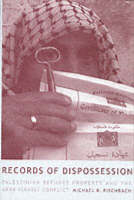
Records of Dispossession
Palestinian Refugee Property and the Arab-Israeli Conflict
Seiten
2003
Columbia University Press (Verlag)
978-0-231-12978-7 (ISBN)
Columbia University Press (Verlag)
978-0-231-12978-7 (ISBN)
During 1947 and 1948, almost half the population of Palestine left their villages and livelihoods. They were never to be compensated for their abandoned property, even though the UN and most other parties acknowledge their rights in this matter. This study explores this issue.
No issue in the Arab-Israeli conflict has proven more intractable than the status of the Palestinian refugees. This work focuses on the controversial question of the property left behind by the refugees during the first Arab-Israeli war in 1948. Beyond discussing the extent of the refugees'losses and detailing the methods by which Israel expropriated this property, the book also notes the ways that the property question has affected, and in turn been affected by, the wider Arab-Israeli conflict over the decades. It shows how the property question influenced Arab-Israeli diplomacy and discusses the implications of the fact that the question remains unresolved despite numerous diplomatic efforts. From late 1947 through 1948, more than 726,000 Palestinians-over half the entire population-were uprooted from their homes and villages. Though some middle class refugees were able to flee with liquid capital, the majority were small-scale farmers whose worldly fortunes were the land, livestock, and crops they left behind. This book tells for the first time the full story of how much property changed hands, what it was worth, and how it was used by the fledgling state of Israel.
It then traces the subsequent decades of diplomatic activity on the issue and publishes previously secret UN estimates of the scope and value of the refugee property. Michael Fischbach offers a detailed study of Israeli counterclaims for Jewish property lost in the Arab world, diplomatic schemes for resolving the conflict, secret compensation efforts, and the renewed diplomatic efforts on behalf of property claims since the onset of Arab-Israeli peace talks. Based largely on archival records, including those of the United Nations Conciliation Commission of Palestine, never before available to the public and kept under lock and key in the UN archives, Records of Dispossession is the first detailed historical examination of the Palestinian refugee property question.
No issue in the Arab-Israeli conflict has proven more intractable than the status of the Palestinian refugees. This work focuses on the controversial question of the property left behind by the refugees during the first Arab-Israeli war in 1948. Beyond discussing the extent of the refugees'losses and detailing the methods by which Israel expropriated this property, the book also notes the ways that the property question has affected, and in turn been affected by, the wider Arab-Israeli conflict over the decades. It shows how the property question influenced Arab-Israeli diplomacy and discusses the implications of the fact that the question remains unresolved despite numerous diplomatic efforts. From late 1947 through 1948, more than 726,000 Palestinians-over half the entire population-were uprooted from their homes and villages. Though some middle class refugees were able to flee with liquid capital, the majority were small-scale farmers whose worldly fortunes were the land, livestock, and crops they left behind. This book tells for the first time the full story of how much property changed hands, what it was worth, and how it was used by the fledgling state of Israel.
It then traces the subsequent decades of diplomatic activity on the issue and publishes previously secret UN estimates of the scope and value of the refugee property. Michael Fischbach offers a detailed study of Israeli counterclaims for Jewish property lost in the Arab world, diplomatic schemes for resolving the conflict, secret compensation efforts, and the renewed diplomatic efforts on behalf of property claims since the onset of Arab-Israeli peace talks. Based largely on archival records, including those of the United Nations Conciliation Commission of Palestine, never before available to the public and kept under lock and key in the UN archives, Records of Dispossession is the first detailed historical examination of the Palestinian refugee property question.
Michael R. Fischbach is professor of history at Randolph-Macon College. He specializes in land issues relating to Israel, Jordan, and the Palestinians and is the author of State, Society, and Land in Jordan.
Refugee Flight and Israeli Policies Toward Abandoned Property UNCCP's Early Activity on the Refugee Property Question Early Israeli Policies Affecting the Property Question Early Arab and International Policies Toward the Property Question UNCCP Technical Program Follow Up to the Technical Program Refugee Property Question After 1967 Conclusion Appendix One: Comparison of Studies on the Scope and Value of Refugee Property Appendix Two: Chronology of Events Relating to Refugee Property
| Erscheint lt. Verlag | 26.11.2003 |
|---|---|
| Reihe/Serie | Institute for Palestine Studies Series |
| Zusatzinfo | 99 figures |
| Verlagsort | New York |
| Sprache | englisch |
| Themenwelt | Geschichte ► Allgemeine Geschichte ► Zeitgeschichte |
| Geisteswissenschaften ► Geschichte ► Regional- / Ländergeschichte | |
| Sozialwissenschaften ► Ethnologie | |
| Sozialwissenschaften ► Politik / Verwaltung | |
| Sozialwissenschaften ► Soziologie | |
| Wirtschaft ► Betriebswirtschaft / Management ► Rechnungswesen / Bilanzen | |
| Betriebswirtschaft / Management ► Spezielle Betriebswirtschaftslehre ► Immobilienwirtschaft | |
| ISBN-10 | 0-231-12978-5 / 0231129785 |
| ISBN-13 | 978-0-231-12978-7 / 9780231129787 |
| Zustand | Neuware |
| Haben Sie eine Frage zum Produkt? |
Mehr entdecken
aus dem Bereich
aus dem Bereich
Gewalt, Umwelt, Identität, Methode
Buch | Softcover (2024)
Spector Books OHG (Verlag)
CHF 49,95
wie Freud im Kollektiv verschwand
Buch | Hardcover (2024)
Klett-Cotta (Verlag)
CHF 34,95


